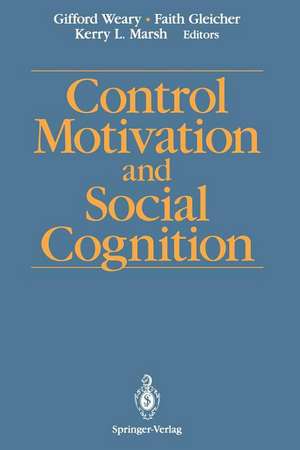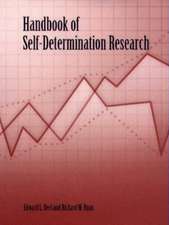Control Motivation and Social Cognition
Editat de Gifford Weary, Faith Gleicher, Kerry L. Marshen Limba Engleză Paperback – 24 ian 2012
Preț: 392.21 lei
Nou
Puncte Express: 588
Preț estimativ în valută:
75.06€ • 81.50$ • 63.05£
75.06€ • 81.50$ • 63.05£
Carte tipărită la comandă
Livrare economică 23 aprilie-07 mai
Preluare comenzi: 021 569.72.76
Specificații
ISBN-13: 9781461383116
ISBN-10: 1461383110
Pagini: 364
Ilustrații: XVI, 344 p.
Dimensiuni: 155 x 235 x 19 mm
Greutate: 0.51 kg
Ediția:Softcover reprint of the original 1st ed. 1993
Editura: Springer
Colecția Springer
Locul publicării:New York, NY, United States
ISBN-10: 1461383110
Pagini: 364
Ilustrații: XVI, 344 p.
Dimensiuni: 155 x 235 x 19 mm
Greutate: 0.51 kg
Ediția:Softcover reprint of the original 1st ed. 1993
Editura: Springer
Colecția Springer
Locul publicării:New York, NY, United States
Public țintă
ResearchCuprins
Section I. Control Motivation: Theoretical Perspectives.- 1. Control, Its Loss, and Psychological Reactance.- Section II. Models of Perceived Control.- 2. Perceptions of Control: Determinants and Mechanisms.- 3. Naturally Occurring Perceptions of Control: A Model of Bounded Flexibility.- 4. The Primacy of Control in Causal Thinking and Attributional Style: An Attributional Functionalism Perspective.- 5. Uncertainty, Mental Models, and Learned Helplessness: An Anatomy of Control Loss.- Section III. Effects of Perceived Control on Social Cognition.- 6. Control Motivation and Attitude Change.- 7. Social Cognition and Power: Some Cognitive Consequences of Social Structure as a Source of Control Deprivation.- 8. Individual Differences in Control Motivation and Social Information Processing.- 9. Control Motivation and Self-Appraisal.- 10. Depression, Control Motivation, and the Processing of Information about Others.- Section IV. Conclusions and Commentary.- 11. The Warm Look in Control Motivation and Social Cognition.- Author Index.















